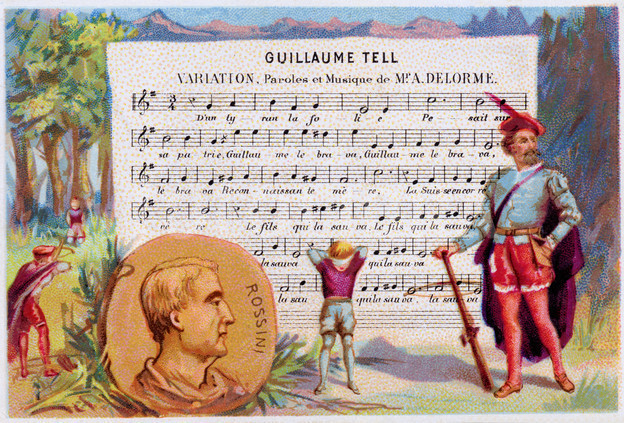Perhaps Renée Fleming's performance before the beginning of Ambroise Thomas's
Hamlet told us something. La Renée started her spiel about how great things would be. Then forgot her lines completely and had to be handed a prompt sheet - filmed live on camera, broadcast to thousands watching in movie houses all over the world. She didn't miss a beat, reading off the card with the same fixed smile and artificial bonhomie. I was at a cinema where the audience burst out snorting at the insincerity. It's not Renée so much as the way the Met works, and the difference between US and European attitudes. And Renée's bombshell : "This is an empty set, this time the focus is on the singers".
Renée is right. The unfussy set emphasizes the action. The set is stylized, the courtiers in simple drab. King Claudius, Queen Gertrude and Ophélie wear monochrome outfits which are streamlined modern takes on mid 19th century costume. For the "Play" scene in Act 2 a long trestle table is wheeled out: a few tureens, no fancy plates and decorations. The table's like a wall between the actors in the play within a play and the "real" murderers watching them. Later, Keenlyside jumps onto the table, pouring a jug of wine over his head. He really looks wild, as if he's covered in blood.
Ô vin, dissipe la tristesse has never been so realistic. After this, long interval (Keenlyside needs a shower).
In Act 3, the backdrop is lit claret-red, so Gertude's claret red dress dissolves into hues of wine or blood, only her haunted gface gleaming white - not unlike the white of the ghost of her late husband. In this subtle way, mother and son are linked, and murderer to murdered. For the all-important mad scene, nothing distracted from Marlis Petersen. Nice touch too, pulling up the floorboards to dig her grave, and finding sand!
Modern as this production was (Moshe Lieser and Patrice Caurier, set Christian Fenouillat)) , the sky did not fall in, nor did the audience collapse in hysterics. The filming was directed by Brian Large, who has made the filing of opera into an art form of its own. He uses close-ups well, so you see musch more than you'd see live. He knows which angles to shoot, and just how much detail to include. He's also musically well-informed. In this case, he picks up on how cleanly Ambroise Thomas orchestrated. Large pinpoints the use of solo instruments - French horn in the overture, oboe, double harps and even saxophone (brand new instrument then, mentioned in Berlioz's
Treatise on Orchestration).
You can follow Thomas's orchestral thinking clearly, which helps a lot in an opera like
Hamlet better known for its big numbers than its overall structure. This opera gets derided but heard on its own terms, it's not all that far from, say, Gounod's
Faust. It's French after all, with a French sensibility. Having Louis Langrée conduct made a huge difference because he did so with precision and clarity. His light but disciplined touch kept the music animated. The performance lasted nearly four hours, but didn't at all feel that long, so vivid was this playing.
Simon Keenlyside created the part in 1996. He's completely immersed, as though he was born to Shakespeare, but the least hammy Hamlet I can imagine. Keenlyside's Hamlet looks tortured, but he's mentally very tough, playing psychological games to break Claudius. Breaking his own mother is part of the process, which gives the struggle a Freudian edge. Keenlyside's French is superb, too.
être ou ne pas être sounds so natural you almost forget what it is in English. He gets the right sardonic Gallic snarl and is completely intelligible without sub titles. Hamlet made his career, the characterization of his lifetime. As Renée said, they did the opera to get him, and you can see and hear why.
Listen to Keenlyside singing in London in 2003 -
STREAMED ONLINE from
Opera Today. It's a very good performance indeed - Louis Langrée conducts, much better than Bertrand de Billy on the Barcelona DVD, and Natalie Dessay as Ophélie, which makes it unmissable. The performances are better than the Met. Brian Large's film of the Met performance, however, is so intelligent and sensitive that the combination of listening to London while thinking of New York is a better experience than having either live.
Natalie Dessay was to have appeared at the Met, too, because Ophélie is one of her great roles. She had to pull, out shortly before, replaced by Marlis Petersen, who had to rehearse while singing in Vienna. Petersen is good, considering, but a little too formal for my taste (which is Mady Mesplé, whose
Lakmé was one of the first LP's I ever bought)
At the Met, Jennifer Larmore sang Gertrude in a nicely tense, edgy performandce - you could see her neck tighten with anxiety in the close-ups, just as you would in a movie. James Morris sang Claudius. His voice isn't what it was, so he didn't develop the character much, but was suitably imposing. Toby Spence as Laerte was described as having been at "Oxford University" another transatlantic term that raised a chuckle with a British audience.
A nod though towards Shakepeare. The play scene was wonderfully danced at the Met - such athletic dancers, so expressive that they seemed to be acting, rather than dancing.They didn't cut all the ballet at the Met, they sublimated it.









